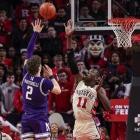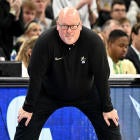MARSHALL, Minn. -- Brad Bigler's kayak flipped, and then he ran through rapids, past fallen trees. Finally, he came face-to-face with his mother. She was clinging to a tree and begging for her life.
"For a split second, I'm holding her," Southwest Minnesota State's 33-year-old head basketball coach said. "Her words were, 'I don't want to die. I'm so tired.' "
Bigler and three male companions had just dumped excess water from their kayaks off the side of the Minnesota River. Bigler was last to turn the corner when he heard the loud commotion. Several voices yelled in panic. Then he saw what had triggered the hysteria: Diane Bigler-Hagenow, dangling from a tree about 100 yards downstream, holding herself up with her arm as the rapids churned across her lower body.
On his left, he watched his father-in-law's kayak flip. To his right, his father-in-law's friend crashed into rocks. Bigler, a novice in a kayak, had to act alone.
Adrenaline rushed. Panic took over.
The rapids were picking up, though, pulling his kayak away from his mother. That's when he flipped and, after pulling himself back above the water, found himself 20 yards away from his destination. Frustrated, he tossed the boat into the woods and worked his way upstream. Just as Bigler arrived, he was faced with the clear exhaustion on her face, and his mother could no longer grip the tree branch. Bigler watched as her hand slid and she flailed helplessly under the water.
That's when Bigler grabbed her, pulled her out of the water and placed her on top of the tree branch.
"I had her," Bigler added. "I had her. I was telling her that we were going to get her out. Then all of the sudden, the whole tree gave and we all went under the water."
Bigler-Hagenow's new husband, John, who was also trying to help, bobbed up about 20 yards away from his wife. Bigler resurfaced and then made his way back toward his mother, who was now firmly trapped underneath the tree. The real fight began as Bigler and John attempted to save her. Bigler remembers it being the three or four longest, most helpless minutes of his entire life.
"I pulled as hard as I could," Bigler said, "but I couldn't get her out. I never let her go."
John jumped on Bigler as both teamed up to make one final attempt to wrestle Bigler-Hagenow from the river. There wasn't even time for fear. It was then, as Bigler held a tight grip on his mother's hand, that his feet gave out in the water, their hands separating for the final time as Bigler was submerged back under the current. He wound up 20 yards downstream and knew his mother's fight to stay alive was over.
"I immediately knew," he said. "I just knew she drowned."
"I wish it on no one," he added. "There was nothing I could do."
Bigler-Hagenow was an energetic, fearless 55-year-old nurse who loved competition as much as her son. An avid kayaker, she proposed the suggestion to go to the area known as "Hot Creek" that summer day in July 2011. She also opted for the more difficult course.
They dropped in the water around 1 p.m. Five of them. It was Bigler, his mother, her husband, Bigler's father-in-law and his friend. The water was abnormally high because of the rain that previous spring, but no one gave it much thought. Certainly not Diane, who was side-by-side with her son in separate kayaks beaming with pride.
She had just learned hours earlier that Brad and Heather Bigler were expecting another addition to the family.
Brad Bigler sat in the passenger seat, sending countless text messages in an effort to get a colleague a job. His wife, Heather, was behind the wheel of their GMC Acadia en route to the family's lake house in Starbuck, Minn. Life had begun to return to normal in the 13 months after his mother's death. The nightmares had subsided, therapy had certainly helped, and so had the Northern Sun Intercollegiate Conference tournament championship and NCAA Division II tournament appearance just months earlier. The family was returning from a cousin's wedding in Granite Falls in July 2012. The two oldest children -- 3-year-old Taleigha and 2-year-old Nash -- had decided to remain behind with Brad's in-laws to dance at the reception. Brad, Heather and their 5-month-old son, Drake, left around 7:45 p.m. and picked up Heather's grandmother, Sharon Schuler, along the way.
They had just taken the final corner where Minnesota State Highway 29 and Pope County Road 41 intersected, just two miles from the lake house. It was 9:20 p.m.
Suddenly, Heather Bigler saw headlights locked directly on her face on the two-lane road. "He's in our lane!" Heather shrieked.
"He's in our lane!"
That's the last thing that Brad Bigler remembers from July 28, 2012.
Dana Schoen's 2005 Dodge pickup truck slammed into the right side of the Biglers' vehicle. Heather swerved to the left, but the collision was unavoidable. The Biglers' vehicle spun and landed in a ditch, resting on its wheels facing southeast, with the entire passenger side sheared off and laying in the ditch several feet away.
Heather immediately turned, looked in the back seat at her 5-month-old baby boy, Drake. He wasn't moving. He was silent. She saw her husband unconscious, curled into the fetal position next to the vehicle. Grandma Sharon, 74, was stuck in the back. Heather walked out of the passenger side.
"I thought he was dead," she said of Brad. "I didn't even go over to him."
She grabbed her cell phone from the ground and called for help, just as her husband had done 13 months earlier after he was unable to save his mother. The phone reception dropped. She then handed the phone to a man who had come over to help. Heather ran to the back seat -- where her baby boy's car seat was dangling out of the car, the straps literally cut in half due to the force of the collision. Drake Bigler was attempting -- with much difficulty -- to breathe. The ambulance showed up minutes later, but not before Heather spotted a man just milling around outside, wandering with no real purpose.
"I couldn't figure out what he was doing," she said. "Then he came up to me and offered me a can of pop."
It was 38-year-old Dana Schoen -- and he was just moments away from blowing a 0.351 into the breathalyzer, a result that checked in at more than four times Minnesota's legal limit. According to the incident report, Minnesota State Trooper Amelia Churchill found two empty beer cans and four unopened cans lying next to the driver's side of Schoen's truck. Inside of the Dodge truck, there were several more beer cans -- both unopened and opened.
Charges levied against Dana Schoen
Heather was furious when she found out alcohol was involved, but it was pure fear that overcame her anger. Her son had yet to cry or open his eyes, her husband momentarily picked up his head before collapsing back to the ground -- and her grandmother was in and out of consciousness. She jumped in the ambulance with her son, headed to Glacial Ridge Hospital, and took one final look out the rear. Her husband was receiving CPR, and her grandmother remained trapped in the back seat.
"Is he breathing? Is he breathing?" she asked on the 10-mile drive to the hospital.
Drake was trying. The medical personnel knew immediately that the young boy had suffered a head injury because he wasn't responding. Heather watched as multiple tubes were stuck in her helpless son. They performed chest compressions, a brain scan and the flashlight test. There was no response. Brad arrived at the hospital moments later and had been taken into the other side of the room with a curtain dividing father and son.
"The doctor looked at me and told me that Drake was brain-dead," Heather said, "that he couldn't do anything on his own and was basically on life support."
That's when the doctors wheeled an unresponsive Brad next to his son and attempted to wake the father of three. Heather will never forget the scene. The doctors shook her husband, telling him: "Sir, your son's not going to make it. Do you want to say goodbye?"
Bigler didn't wake up in time. Drake Philip Bigler died at 10:10 p.m., 50 minutes after the collision.
"I held him until he took his final breath," Heather said. "I wrapped him in a blanket to try and make him warm again. It was such a helpless feeling. We do everything we can to protect our children, and there was nothing I could do. So helpless. I didn't want to let him go."
She had no choice. Heather handed her son to her father and turned her attention to her husband, whose life was in doubt. She stepped on a plane with medical personnel, her husband and her grandmother -- and headed for Sioux Falls, S.D., and a facility better equipped to handle Brad’s head injury.
Brad Bigler finally woke up around 4 a.m. on Sunday at Avera Hospital in Sioux Falls, looked down and saw the bloody neck brace and cords running across his body. He was unaware of what had happened but quickly moved his arms and legs. He was unable to move his right side. Bigler had suffered multiple broken ribs, a collapsed lung, a C-7 neck fracture, a broken scapula and a head injury. In total, there were 10 broken bones. Grandma Sharon had suffered nearly identical injuries. Both were in critical condition but expected to survive.
He then saw his wife, tears streaming down her face. Heather delivered her husband the news: Drake was gone.
"I went numb," he recalled. "My emotions were flooding. I was dazed and confused because of all the medication, but I still couldn't believe it."
As the week went on, Bigler's condition began to improve. He was released from the hospital within the week, and the parents began to reflect on what happened.
"As horrible as the situation is, it could have been worse," Brad said. "Heather could have lost her whole family -- her husband and three kids."
Little Taleigha's decision to remain at the wedding reception to dance likely saved both her and her younger brother, Nash.
"I still have two of my children," Heather said. "Part of my heart died that night, and it's something we have to learn to live with. How do you do it?"
When Bigler turned the corner at the courthouse, he saw him. Dana Schoen. His child's killer. Their eyes met for a split second, and Schoen immediately dropped his head. The adrenaline had begun to consume Bigler, but he grabbed his wife, now sobbing at the sight of Schoen, and walked up the stairs.
It was Dec. 4 at the plea hearing. The Biglers had since learned the accident had marked the third time that Schoen was arrested for driving while intoxicated. They had yet to hear anything from the man who was convicted in 2000 and again in 2005. In both instances, his blood-alcohol content was greater than 0.20 percent, or 2½ times the legal limit in the state. There had been no apology, no remorse, no contact.
However, the Biglers won't allow themselves to be overcome with rage, despite the fact Schoen took their youngest child 168 days into his life. The community has been extremely supportive of Bigler, who was basically raised in the Southwest Minnesota State program as a player, assistant coach and now head coach of the Mustangs. Within a week of the car accident, a meal-and-work calendar had been filled out through November, with families delivering meals, mowing the lawn and doing other chores to ease the burden. A Drake Philip Bigler memorial was established, and more than $20,000 has been raised in the past five-plus months.
"He's a better person than we are," said Southwest Minnesota State Director of Athletics Chris Hmielewski. "The way he and his family have handled the tragedies over the past year. We have all learned from Brad and Heather -- and can continue to learn from their strength."
The players on the team feel the same way. Southwest Minnesota State is 10-9 this season, including a 7-5 record in conference play. Bigler said he has minimal lingering physical effects from the injury, although the nightmares still persist -- as does counseling in order to deal with his grief. Heather's grandmother has also recovered from her injuries and comes to Marshall to take care of the two children, although she often says that "they do more for me than I do for them."
"He's been amazing," senior guard Tramel Barnes said of his coach. "I don't know how he's done it, but he's been incredible. I just can't imagine what he's had to go through."
Drake Bigler's items have been moved into the storage room. It became too painful each and every day. Nash doesn't run around the house quite as often these days searching for his younger brother, but Taleigha -- once an outgoing child -- has become withdrawn.
"We can't change who we are as people," said 29-year-old Heather.
"At times we get angry," Brad added, "but you can't allow the anger to get the best of you."
Schoen pleaded guilty to three counts of criminal vehicular operation and was released on $40,000 bail (he had to pay $4,000) and was back on the streets.
"Where's the justice in that?" Heather asked. "This is the third time -- and he killed my child."
Mothers Against Drunk Driving (MADD) reports that one-third of all drivers arrested or convicted of driving while intoxicated or driving under the influence are repeat offenders. In 2008, the organization reported that there were 2 million three-time offenders on the road and 400,000 people who had been convicted five times of drunk driving. MADD also reports that 75 percent of offenders continue to drive -- even with a suspended license.
"The laws are horrible," she added. "It's not our goal in life to go after the government, but people can make a decision to drink or drive. It's as simple as that. We just want to educate people. And if we can help save someone else's life, it's worth it."
The sentencing hearing is scheduled for Friday. That's when the Biglers will learn the fate of Schoen. The likelihood, they have been told, is that Schoen will receive a four-year sentence and be released after about 30 months.
It's too late for an apology, but the Biglers want to make certain that Schoen understands the impact of his decision and the pain that he has caused an entire family. Brad, Heather and both grandparents will speak in front of the judge. Then they will play a 5½-minute gut wrenching videotape of Drake Philip Bigler.
Schoen will see the family photo taken just moments after Drake was born on Feb. 11, 2012. He'll watch Brad rub his head in Drake's stomach as the little boy laughs. If he can't bear to look, he'll still hear Taleigha and Nash singing to their brother. He'll hear the words from the song Precious Child that was chosen as an accompaniment.
There is a hole that can never be filled
But in my heart there is hope 'cause you are with me still
In my heart, you live on
Always there, never gone.
"I'm not asking for an apology," Brad Bigler said. "It's too late. But I want him to hear us, I want him to have to watch that video. I want him to see what he took away from us."
Schoen took their precious child. Drake Bigler is gone too soon, just like the grandmother whom he never knew.
 |
| Drake Bigler was killed 168 days after being born, gone at a time where he couldn't say words but expressed love like this. |
Jeff Goodman is a national college basketball writer for CBSSports.com. For more college basketball stories, news, rumors and analysis, follow @EyeOnCBB on Twitter, like us on Facebook and subscribe to the thrice-a-week podcast on iTunes. You can follow Jeff on Twitter here: @GoodmanCBS.



















